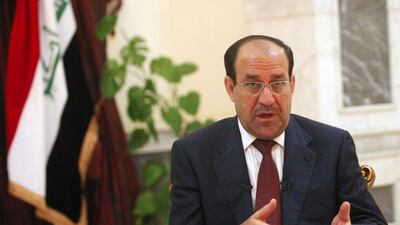In a lot of ways, Iraq today resembles Iraq in 2005. Many Sunni tribal and religious leaders are standing side by side with the federal government to fight Al Qaeda in the province of Anbar. But, just like the period that followed that momentum, Baghdad and Washington are set to miss a historic opportunity that will eventually play into the hands of Al Qaeda.
There are competing narratives for what has happened in Anbar since Nouri Al Maliki, the prime minister, announced the military offensive on December 25. Some maintain that various Sunni leaders support the military campaign to expel the Al Qaeda-affiliated Islamic State of Iraq and Syria (Isis). Others say that the Sunni tribes are facing down Mr Al Maliki's sectarian forces. The reality is more nuanced, and that is where the opportunity lies.
“We don’t like Isis, but we also don’t like to be treated like second-class citizens,” said Falah Al Aissawi, the deputy head of the Anbar provincial council. The reality is that many Sunnis are as opposed to Al Qaeda as everyone else in Iraq. Though they have been alienated by Mr Al Maliki for years, they view him as the lesser of two evils, which is why many prominent Sunni leaders have supported the campaign.
But the way Mr Al Maliki has conducted the campaign seems likely to backfire. The first of his blunders was the speech in which he announced the campaign. He described the campaign as “a fierce confrontation between the supporters of Hussain and the supporters of Yazid” – referring to the killing of the Prophet’s grandson, Hussain (a Shia symbol of martyrdom), by the army of the second Ummayad caliph, Yazid bin Muawia, in Karbala. Then, footage emerging from the campaign showed security forces raising Shia religious banners and slogans.
It was strange for the prime minister to use unequivocally sectarian language while state media broadcast non-stop interviews with Sunni tribal and religious figures who spoke in favour of the military campaign. Such statements and slogans only lend weight to the propaganda from Isis that they are facing a sectarian government that has no interest in integrating them into a fair system. Instead of uttering sectarian language, Mr Al Maliki had a golden opportunity to work with Sunni tribal and religious leaders to stabilise the restive Sunni region. Had he done that, sectarian tensions would be significantly reduced as Sunnis would find the government to be for every Iraqi, regardless of their sect, and Shia who are rightly fearful of Al Qaeda would see that Sunnis can be partners against extremism.
It is naive to think that Mr Al Maliki did not intend to sound sectarian – it was not a passing comment but made in long and coherent sentences. The question is, what is the purpose? There is also a question about the timing of the campaign.
Mr Al Maliki insists that local protest camps have been breeding grounds for extremism and have been used by Al Qaeda as bases to launch attacks in other areas. But these sites have been in place for a year. And sectarian language at the podiums in the camps, by many accounts, was used many months ago and that it was actually toned down later after pressure from some protest leaders. Additionally, Al Qaeda had been more active and deadly before October than when the campaign was announced.
Some say the timing came after officials felt that the population in Anbar was ready to cooperate with the government due to their estrangement by radicals in their areas. But if that is the case, why would the prime minister use sectarian language that would potentially alienate the population. As Iraq analyst Kirk Sowell argued in The National last week, the situation in Anbar had been developing in Mr Al Maliki’s favour: the protests that initially attracted tens of thousands had lost momentum.
The parliamentary election in April should be the starting point for understanding Mr Al Maliki’s motives. Regardless of how the military campaign pans out, Mr Al Maliki is likely to gain. If he manages to defeat Al Qaeda, he will emerge as a national hero who has fought himself into a third term. With the personal networks he has established for himself inside the country’s key security and economic institutions, it will be unimaginable to replace him with another official as the prime minister. Iraq has failed to build the democratic institutions that would make it smooth to take over such a daunting task from Mr Al Maliki. If the campaign fails, the situation in Anbar will possibly deteriorate and might lead to more divisions within the Sunni population between those who supported the government and those who fought against it. Instability in Sunni areas will favour the prime minister, and he will still be seen as a hero for the Shia.
Sadly, such politics comes at the expense of the national reconciliation that was Mr Al Maliki’s ticket into the prime ministership in 2006. Baghdad is not only missing a unique opportunity to move beyond the sectarian equation but it will probably make the situation more favourable for Al Qaeda, which thrives on instability just as Mr Al Maliki does.
Washington has a role to play because it supported the campaign morally and by supplying military equipment. Unlike the dominant narrative in American media, Baghdad’s offensive is not conducted as a state fighting Al Qaeda militants. The campaign is tainted by sectarian language without promises of reform that will help to find a resolution to Sunni grievances.
hhassan@thenational.ae
On Twitter: @hhassan140

